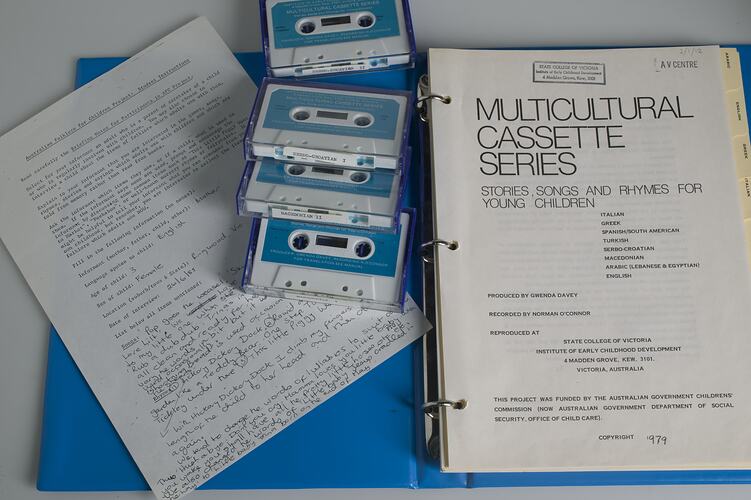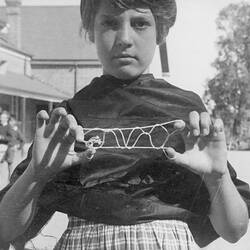In 1976 a substantial body of immigrant folklore for young children was collected in Melbourne for the Multicultural Cassette Series (MCS). The project was funded by the Australian Government Children's Commission and administered by the then Institute for Early Childhood Development on a non-profit basis as a service to Australian children. The project was lead and produced by Dr Gwenda Davey with sound recording by Norman O'Connor.
Aims
The MCS was a groundbreaking piece of work for its time. It aimed to enrich the informal language environment of young children by encouraging first language maintenance and to ease the transition between home and school or preschool for children from culturally and linguistically diverse backgrounds.
A broader aim was to encourage cultural interchange between children of all nationalities. Some teachers found that children were intrigued to listen to languages that were not their own and believed that increased tolerance and sensitivity can result from informal experiences with other languages.
Format and content
The MCS consists of 26 cassettes in eight languages: Italian, Greek, Spanish, Turkish, Serbo-Croatian, Macedonian, Arabic and English. Each cassette contains stories, poems, rhymes and songs. In total there are 115 items of verbal folklore in the MCS. Content was chosen to appeal to children between the ages of three and eight, but it was envisaged that children both younger and older would also enjoy the recordings. All the content was supplied by members of the language communities represented. Many of those voices can be heard on the cassettes. All the music used was from local ethnic musicians or authentic recorded music.
The principle criteria for selection of the material were the authenticity of the sources and what was still in transmission. Just under half the items in the Series were still in transmission as 'family favorites' at the time of recording. Children's books and folktale collections were also used as source material.
In selecting material from published works it was noted that many published collections of folktales failed to give sources or simply drew upon earlier publications of a similar type. The MCS project prompted Dr Davey to collect broader data on folklore for children to determine which items were still in active transmission and their frequency. These two factors are key to authenticity. Traditional games, sayings and admonitions were included in the project, as well as songs and rhymes in English and other languages.
The MCS cassettes are housed at Museums Victoria together with 40 field recordings. The National Library in Canberra has digitized copies of the 26 cassettes. This material can be accessed by students and researchers.
The Multicultural Cassette Series Manual contains a chapter for each language group with English synopses/translations of every item. These written translations can be viewed by language in the attached documents. There is no English translation on the cassettes themselves.
References
Davey, G., 1981. Multicultural Cassette Series, Institute of Early Childhood Development.
Davey, G., 1985. Duck Under the Table: Adult Folklore for Children, Australian Children's Folklore Newsletter, No. 8, pp. 6-9.
Davey G., 1983. Are Nonsense Rhymes for Young Children Culturally Universal? Australian Review of Applied Linguistics, Vol. 6, No. 1, pp. 109-115.
More Information
-
Keywords
-
Localities
-
Authors
-
Article types

